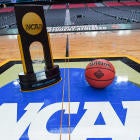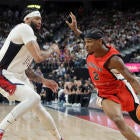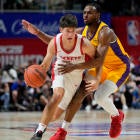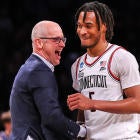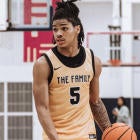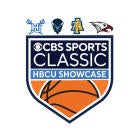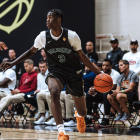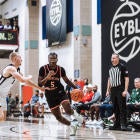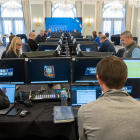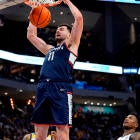NEW YORK -- If James Gatto, Christian Dawkins and Merl Code are to come out of their corruption trial with a verdict of not guilty attached to their names, it's going to have to happen the unconventional way -- without laying blame at the feet of the NCAA.
The groundbreaking case, which could rest as early as Tuesday afternoon, resumes Monday morning in the commodious courtroom on the 26th floor of the Daniel Patrick Moynihan Courthouse. Star witness T.J. Gassnola, a former program director of an Adidas grassroots team and someone who became a bag man for the apparel giant in recent years, will continue to face cross-examination from the defense.
And while just about anyone and everyone who pays attention to college athletics has an opinion about the NCAA's amateurism model, the arguable nature of one of sports' most polarizing organizations is now off limits.
U.S. District Judge Lewis A. Kaplan made sure of that Thursday.
"I will not have it, Mr. Schachter, I will not have it," Kaplan said to Gatto's lead defense attorney, Michael Schachter. "You're not going there."
By "not going there" Kaplan meant dragging the NCAA into this as means to broaden the parameters of the trial's arguments. Here's the defense team's pickle: Even if NCAA rules are critical to this ordeal happening to begin with, the laws allegedly broken by Gatto, Code and Dawkins supersede NCAA jurisdiction of course. With Kaplan's admonishment, the pathway to a not-guilty verdict became undeniably more problematic. In a five-minute dress-down of the defense (intentionally done with no jury in the room or any witness on the stand, as to not influence either) the Honorary Judge reminded both sides what the basis of this trial is and why the NCAA's business has nothing to do with the matter at hand as far as he, and the law, are concerned.
"Ladies and gentlemen, we are here today because the government alleges that Jim Gatto committed two federal offenses when Adidas took a tiny portion of the money that it brought in and shared it with the families of the players on the court," Kaplan said. "Now, the purpose of this trial is not to determine whether the NCAA amateurism rules are good or bad. It has nothing to do with it."
Kaplan rightly accused the defense of trying to "elicit the sympathy of the jury" by bringing up the NCAA's amateurism model, highlighting the financial plight of many prospects in the process. Sean Miller makes $4 million annually? Doesn't matter. The NCAA doesn't permit a prospect living in horrific poverty to take even a $50 bill from a booster at Kansas? Irrelevant.
"It was my view, and it remains my view, that the introduction by counsel for Mr. Gatto of the issue of the wisdom and impact of those rules on college players and others doesn't belong in this courtroom," Kaplan said. "It belongs in the NCAA or the halls of Congress or in the boardrooms of universities. It has no proper bearing on this case. It doesn't matter if they were children of Bill Gates or of welfare mothers. That's not the issue."
At the start of the trial, Casey Donnelly -- another attorney representing Gatto -- called out the NCAA and its bureaucratic practices, painting the organization as an unfair one that helps pockets millions for many but none for its student-athletes. Donnelly's argument echoed a position that's grown exponentially popular over the past decade.
And so these jurors were explicitly selected on the basis that they did not have a predisposed opinion of the NCAA. In the spirit of a proper trial, Kaplan's fighting to keep it that way.
"Whether it was an invitation for the jury to put aside the evidence in this case and the law and do what counsel was suggesting in the opening statement was the equitable result, which was to overlook payment of these kids, which would have been highly improper, or something else, it was manifestly inappropriate," Kaplan said, taking Schachter to task.
Kaplan picked apart Schachter's strategy and put an end to it. Not allowing questioning from the defense that brings into argument the very nature of amateurism as it pertains to NCAA bylaws has got to feel like a kick to the back of the knees for the defense.
But it's important to keep in mind that the men on trial are accused of defrauding universities. Even if your opinion is that such a case is flimsy, that's irrelevant to the proceedings at hand for now. If a jury decides that, so be it. It won't be too long now -- maybe even less than a week -- before we have an outcome.
A common commentary of this trial, and criticism of the case, is how shaky the charges are against Gatto, Code and Dawkins. How could the schools be cheated when they wanted the players to begin with? And if the players were acquired on a de facto black market because of competition from other schools, then so what? Win some, lose some.
But to sit in the courtroom is to hear a different tone than from the many who've dismissed this case's objective.
The prosecution has effectively questioned its witnesses and moved along with little objections by the defense to its direct examinations. Meanwhile, the defense is getting chided by Kaplan on the regular after successful objections from a standout team of relatively young prosecutors. That's led to some zigzag cross-examination by the defense.
One can't help but wonder how all of this is playing for the jury. If you were to evaluate the trial based on who's questions are getting more information out and which side is appeasing the judge's wishes, it's unquestionably the prosecution at this point. (And to be fair, the defense is yet to call its witnesses; it remains uncertain whether it will call any, or if any of the defendants will ratchet up the drama by opting to take the stand.)
Again, this comes down to the government's argument that a trio of men who were financially and/or potentially invested in Adidas tipped the playing field for non-Adidas schools by poisoning the well. But everyone drinks the same water. Gassnola testified to as much on Thursday when he said Nike and Under Armour are just as cutthroat in chasing prospects as Adidas is.
So for as much as Kaplan wants to keep out the NCAA bashing, opinions on the organization may well creep into the minds of some jurors. The defense's argument is that, yes, these payments absolutely happened. (They have no choice; the wiretaps, videos and subpoenaed bank statements prove it.) But how could a school be defrauded for acquiring the talent it wanted to acquire?
Schachter attempted to elucidate on this to Kaplan, to establish that it was never a known intention of Gatto, Code and Dawkins to defraud anyone. He argued they didn't even realize they were breaking federal laws.
Kaplan's having none of it, calling the defense's initial cross of Gassnola "inappropriate."
Far as Kaplan's concerned, the I-didn't-know and the everybody-does-it defenses are boobytraps for the jury, a means of building an opinion for a separate philosophical matter from what, and who, is on trial.
If the defense has real hope, it lies with this: open to interpretation is whether coaching staffs knew what was actually happening with certain prospects' families getting paid to play at their schools. If that is the case, and it can be established, then it's probably paramount to the defense, which will have to then lay that reality on heavily to the jury during its closing argument.
The defense sees coaches and schools as one in the same -- you can't defraud yourself. The prosecution sees the schools as a separate entity from the coaches it employs.
That nebulous but important distinction might be want this trial's verdict hinges on.
It's why Gassnola testimony that former NC State assistant Orlando Early accepted $40,000 in cash at his home could prove crucial. The money was supposedly delivered from Early to Dennis Smith Jr.'s trainer. And at Louisville, former assistant Kenny Johnson is said to have given Brian Bowen Sr. $1,300 -- this the latest in a run of payments over the years by Adidas to the Bowens.
Even Gassnola said he didn't pay $20,000 to the guardian of current Kansas forward Silvio De Sousa merely because the investigation broke publicly and he didn't get the chance to.
For Kaplan, the court's case must remain about three men who are accused of breaking federal laws when they conspired to defraud universities, and in doing so, moved tens of thousands of dollars across state lines, be it by moving $40 grand on a plane or zipping $20 grand via wire transfer.
"The reason for that is because the government and these defendants are entitled to a verdict that is not swayed by extraneous considerations about the NCAA, the wisdom of its rules," he said. "The question is whether federal statutes were violated."
Gatto, Code and Dawkins are on trial. Not the NCAA.
And Judge Kaplan's making damn sure things stay that way. That adjudication might lampoon the defense. It might be what decides this trial -- and potentially the next two to come in 2019.








